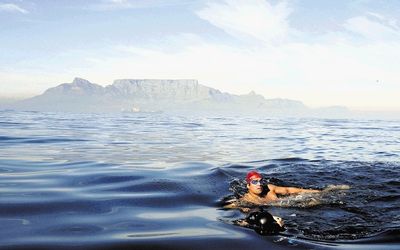SOMETIMES threats of violence work wonders. Only kidding — well, maybe not altogether. I had a mathematics teacher in primary school, Miss Brownlee, a no-nonsense spinster who looked just like you’d expect a spinster maths teacher to look. She would rap us over the knuckles really hard with a ruler if we got a sum wrong.
My pain threshold wasn’t as high then as it is now — after childbirth, nothing fazes my synapses sufficiently to pass the message onto my brain that I’m in agony. My Greek forbears, the Spartans, would be proud of me.
Back in Miss Brownlee’s class, I was a ninny. Mistakes weren’t an option. My maths marks shot into the stratosphere and stayed there to get me a distinction in matric.
My good friend in Cape Town, Zenprop divisional director Theodore Yach, is cut from the same Spartan cloth. Yach, an extreme swimmer, was a four-year-old tot when he started swimming lessons. His teacher, Mrs Mack, kept a pair of pliers on the pool side and threatened to pull out his teeth if he didn’t swim properly. True story.
She didn’t put him off one of the best forms of exercise for health and fitness. Mrs Mack’s "methodology", as Yach euphemistically calls her teaching style, "must have resonated", he says. He recently completed his 99th Robben Island swim crossing, at the tender age of 58 — sans wetsuit. He is aiming for his 100th later this month.
Yach has an impeccable extreme swimming pedigree: in addition to the island swims, he crossed the 36km English Channel in 1996 and swam the 22km Sea of Galilee lengthwise as well.
Swimming in the sea appeals to his "need for solitude", away from the hectic lives most of us lead. Coupled with his enjoyment of cold water and the womblike rhythm of the ocean swells, that’s his idea of bliss.
There’s the added pleasure when dolphins, whales, seals or penguins join him for a frolic — "experiences that are increasing in Table Bay as conservation methods take hold", Yach says.
He has had the pleasure and privilege of helping about 100 other ocean swimmers reach their goals.
In a different life, Yach says he would have enjoyed coaching ocean swimmers. His training focuses on consistency — he swims on average 20km a week, with a session of basic weight-training exercises as well.
...
HIS training regimen generally consists of "pyramid sessions" — one length slow, one fast — all the way up to 20, then back down again. "Totally exhausting, and, builds endurance," he says.
These prepare him for that "final push to the shore" when his body is aching and exhausted. The brain is, after all, the most important driver of sports performance. Just ask University of Cape Town emeritus professor Tim Noakes, who has done world-first research to show just that.
The most dramatic training change Yach has made recently, though, is to his diet. And no, he isn’t Banting (as low-carbohydrate, high-fat eating is known in SA), although he is a staunch supporter of Noakes, a world-renowned nutrition and sports scientist.
Noakes is facing a charge straight out of Alice in Wonderland by the Health Professions Council of SA of unprofessional conduct for his "unconventional" views on butter, eggs, bacon, and broccoli.
Quite when, how and why dieticians from the Association for Dietetics in SA, who are behind his prosecution, and who give the same advice, decided these foods constituted "unconventional" advice eludes me.
Yach doesn’t eat meat, and despite being an ocean water baby (or perhaps because he’s one), he eats very little fish. Fish are, after all, often his companions. Instead, he eats "huge amounts" of vegetables and fruit, has cut out most processed foods and high-sugar soft drinks, and drinks mostly water on the swim.
His per-kilometre average times have improved considerably since he cut out processed foods and sugary soft drinks.
You don’t have to go to his extremes to benefit from swimming. For more ordinary mortals, experts say it is excellent exercise that:
• Is suitable at any age and practically any physical condition;
• Uses most major muscle groups and makes vigorous demands on heart and lungs;
• Develops muscle strength and endurance, while improving posture and flexibility;
• Helps if you are overweight, pregnant or plagued with leg or lower back problems — and to maintain a healthy weight (as long as you don’t stuff yourself with carbs and processed foods);
• Provides most of the aerobic benefits of running without the stress on joints and connective tissue from pounding pavements;
• Has many of the benefits of resistance training; and
• Is a brilliant mood boost, courtesy of a flood (pun unintentional) of feel-good hormones known as endorphins that physical activity sends coursing through your bloodstream.
You don’t need science to tell you swimming is good for your body, heart and mind, which is just as well. Harvard scientists say swimming is "a backwater of exercise research".
There has been "barely a trickle" of studies during the years on swimming and heart disease.
There is evidence of heart healthy-benefits of swimming, and protection against cardiovascular disease, but not so much for bones. Swimmers need to do some type of weight-bearing exercise, such as walking, gentle jogging, dancing, stair-climbing, or tai chi.
PUBLISHED IN BUSINESS DAY – NO REPUBLICATION RIGHTS

Theodore Yach in the waters of Table Bay. He recently completed his 99th Robben Island swim crossing, at the tender age of 58 without a wetsuit. He is aiming for his 100th, later this month. Picture: JEREMY FELDMAN
SOMETIMES threats of violence work wonders. Only kidding — well, maybe not altogether. I had a mathematics teacher in primary school, Miss Brownlee, a no-nonsense spinster who looked just like you’d expect a spinster maths teacher to look. She would rap us over the knuckles really hard with a ruler if we got a sum wrong.
My pain threshold wasn’t as high then as it is now — after childbirth, nothing fazes my synapses sufficiently to pass the message onto my brain that I’m in agony. My Greek forbears, the Spartans, would be proud of me.
Back in Miss Brownlee’s class, I was a ninny. Mistakes weren’t an option. My maths marks shot into the stratosphere and stayed there to get me a distinction in matric.
My good friend in Cape Town, Zenprop divisional director Theodore Yach, is cut from the same Spartan cloth. Yach, an extreme swimmer, was a four-year-old tot when he started swimming lessons. His teacher, Mrs Mack, kept a pair of pliers on the pool side and threatened to pull out his teeth if he didn’t swim properly. True story.
She didn’t put him off one of the best forms of exercise for health and fitness. Mrs Mack’s "methodology", as Yach euphemistically calls her teaching style, "must have resonated", he says. He recently completed his 99th Robben Island swim crossing, at the tender age of 58 — sans wetsuit. He is aiming for his 100th later this month.
Yach has an impeccable extreme swimming pedigree: in addition to the island swims, he crossed the 36km English Channel in 1996 and swam the 22km Sea of Galilee lengthwise as well.
Swimming in the sea appeals to his "need for solitude", away from the hectic lives most of us lead. Coupled with his enjoyment of cold water and the womblike rhythm of the ocean swells, that’s his idea of bliss.
There’s the added pleasure when dolphins, whales, seals or penguins join him for a frolic — "experiences that are increasing in Table Bay as conservation methods take hold", Yach says.
He has had the pleasure and privilege of helping about 100 other ocean swimmers reach their goals.
In a different life, Yach says he would have enjoyed coaching ocean swimmers. His training focuses on consistency — he swims on average 20km a week, with a session of basic weight-training exercises as well.
...
HIS training regimen generally consists of "pyramid sessions" — one length slow, one fast — all the way up to 20, then back down again. "Totally exhausting, and, builds endurance," he says.
These prepare him for that "final push to the shore" when his body is aching and exhausted. The brain is, after all, the most important driver of sports performance. Just ask University of Cape Town emeritus professor Tim Noakes, who has done world-first research to show just that.
The most dramatic training change Yach has made recently, though, is to his diet. And no, he isn’t Banting (as low-carbohydrate, high-fat eating is known in SA), although he is a staunch supporter of Noakes, a world-renowned nutrition and sports scientist.
Noakes is facing a charge straight out of Alice in Wonderland by the Health Professions Council of SA of unprofessional conduct for his "unconventional" views on butter, eggs, bacon, and broccoli.
Quite when, how and why dieticians from the Association for Dietetics in SA, who are behind his prosecution, and who give the same advice, decided these foods constituted "unconventional" advice eludes me.
Yach doesn’t eat meat, and despite being an ocean water baby (or perhaps because he’s one), he eats very little fish. Fish are, after all, often his companions. Instead, he eats "huge amounts" of vegetables and fruit, has cut out most processed foods and high-sugar soft drinks, and drinks mostly water on the swim.
His per-kilometre average times have improved considerably since he cut out processed foods and sugary soft drinks.
You don’t have to go to his extremes to benefit from swimming. For more ordinary mortals, experts say it is excellent exercise that:
• Is suitable at any age and practically any physical condition;
• Uses most major muscle groups and makes vigorous demands on heart and lungs;
• Develops muscle strength and endurance, while improving posture and flexibility;
• Helps if you are overweight, pregnant or plagued with leg or lower back problems — and to maintain a healthy weight (as long as you don’t stuff yourself with carbs and processed foods);
• Provides most of the aerobic benefits of running without the stress on joints and connective tissue from pounding pavements;
• Has many of the benefits of resistance training; and
• Is a brilliant mood boost, courtesy of a flood (pun unintentional) of feel-good hormones known as endorphins that physical activity sends coursing through your bloodstream.
You don’t need science to tell you swimming is good for your body, heart and mind, which is just as well. Harvard scientists say swimming is "a backwater of exercise research".
There has been "barely a trickle" of studies during the years on swimming and heart disease.
There is evidence of heart healthy-benefits of swimming, and protection against cardiovascular disease, but not so much for bones. Swimmers need to do some type of weight-bearing exercise, such as walking, gentle jogging, dancing, stair-climbing, or tai chi.
PUBLISHED IN BUSINESS DAY – NO REPUBLICATION RIGHTS




















Change: 0.80%
Change: 0.61%
Change: -0.25%
Change: 0.13%
Change: 4.02%
Data supplied by Profile Data
Change: 1.13%
Change: 0.37%
Change: 0.80%
Change: 0.00%
Change: 0.33%
Data supplied by Profile Data
Change: -2.03%
Change: -1.51%
Change: -1.45%
Change: -2.26%
Change: -0.91%
Data supplied by Profile Data
Change: 0.07%
Change: 3.71%
Change: 2.65%
Change: 3.36%
Change: 4.99%
Data supplied by Profile Data